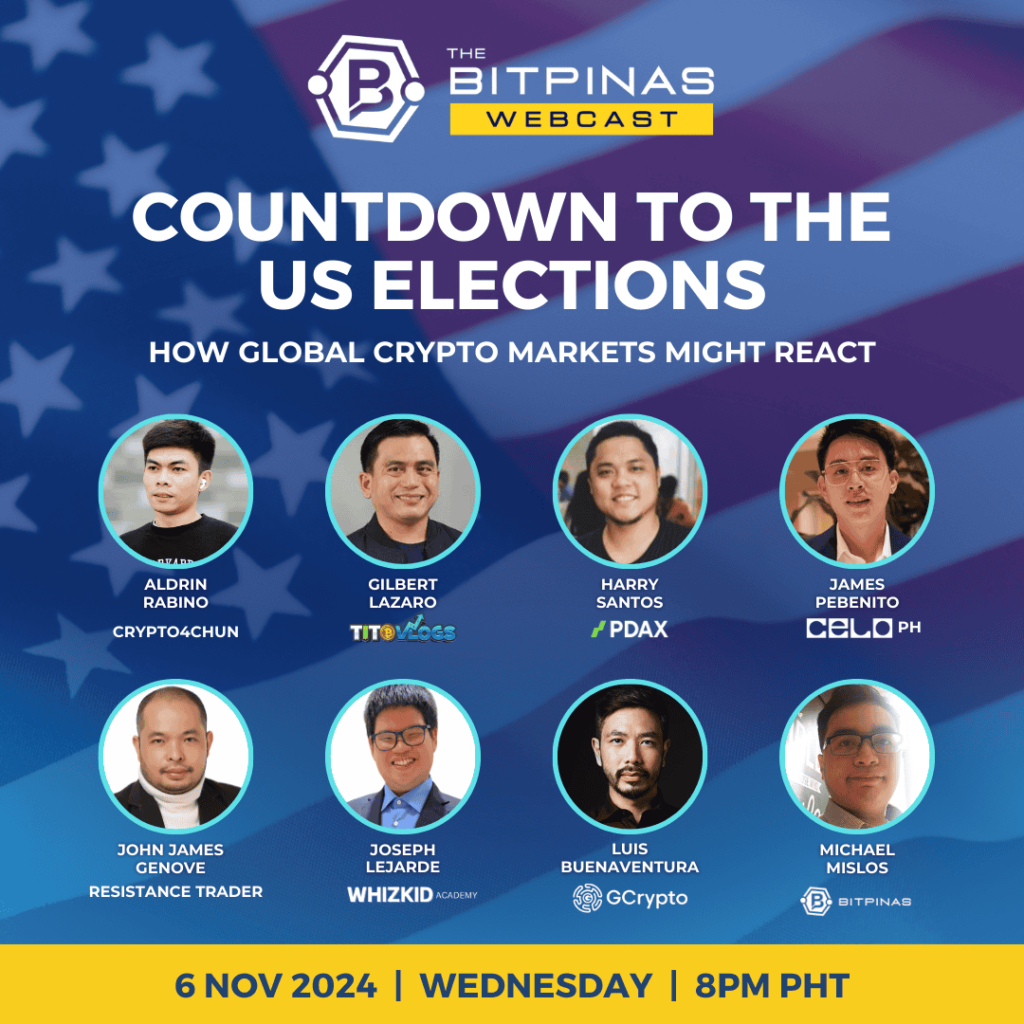Clip Interview: How will the Trump Presidency Impact Crypto Regulations in the Philippines? | BitPinas

In a special episode, the BitPinas Webcast has assembled seven widely respected individuals in the local crypto community and joined BitPinas Editor-in-Chief Michael Mislos to discuss the effects of Donald Trump’s victory on the crypto industry, regulation, and market performance here in the Philippines.
The interview happened on the 58th episode of the BitPinas Webcast, an education show that talks to people, both Filipinos and other races, who move the crypto industry forward.
In Focus: On November 5, 2024, another history has been created as the U.S. election result elected Donald Trump after being kicked out after his first term in 2020.
Recent news: Trump has repeatedly said he is “pro-crypto” and the wider crypto community has supported his bid for the White House, speculating that crypto adoption and better regulation would be promoted under his influence.
The following excerpt, edited for clarity, from the webcast, focuses on the guests’’ thoughts on how a “pro-crypto” Trump administration will bring significance to the crypto industry in the Philippines.
Interview on How a Trump Presidency Affects #CryptoPH
Michael Vincent Mislos, Editor-in-Chief, BitPinas: Are there any changes we might see in regulations or adoption trends in the Philippines as a result of a Trump win?
Additionally, would there be more long-term negative impacts on the global economy and crypto given Trump’s stance on geopolitics?
Point 1: PH Has Delayed Actions in Adopting U.S. Regulations
Gilbert Lazaro, Content Creator also known as TitoVlogs: Regarding Trump’s policies and their impact on crypto, I think it is unlikely that we will see significant changes here in the Philippines. Our country tends to follow the U.S., but there is a lag in policy adaptation.
Right now, we are still in the early stages of understanding crypto regulations. While there are initiatives, they are not yet comprehensive. Unless the U.S. passes clear laws during Trump’s potential term, the Philippines will not have enough basis to develop similar regulations.
Crypto isn’t yet a high priority here because the adoption rate is not substantial enough for policymakers to focus on. Platforms like BitPinas and other shows play an essential role in educating Filipinos about crypto, even if they do not actively invest yet. Understanding is crucial, as blockchain and web3 are part of the future, whether or not people are ready to adapt.
Luis Buenaventura, Head for Crypto, GCash: I agree with Tito Vlogs. The Philippines often takes time to adopt US policies.
Point 2: PH’s War on Unlicensed CEXs Will Continue
Buenaventura: However, I want to point out a key current trend: the SEC in the Philippines is banning popular international exchanges and trading platforms like Binance, eToro, OctaFX, Bitget, and OKEx. This trend will likely continue, independent of U.S. policies.
These moves aren’t strictly about crypto but rather ensuring that trading platforms are properly licensed. Unfortunately, few platforms meet these criteria, which impacts Filipino traders negatively. Many global platforms find it too challenging to meet local compliance requirements and pull out voluntarily as eToro did. This reflects the difficulties in navigating our regulatory landscape.
Point 3: PH’s Slow Adaption and Advancement Not Just in Crypto
John James Genove, Content Creator, also known as The Resistance Trader: I find Tito Vlogs’ and Luis’ insights accurate.
Policy adoption in the Philippines is notoriously slow, not just in crypto but across various sectors, like broadcast standards. If we’re still grappling with foundational issues like internet distribution, expecting rapid regulatory adaptation for something as complex as crypto is unrealistic. The main challenge remains infrastructure and accessibility.
Point 4: On Trump’s Geopolitics Plans’ Effects on Crypto
Genove: Regarding long-term global impacts, Trump’s “America First” approach could have broader economic consequences. However, the decentralized nature of crypto means the community holds significant influence. Market trends driven by supply and demand are resilient against policy shifts, so the impact might be mitigated.
Mislos: John, I have a follow-up question, will Trump’s “America First” stance have a more negative impact on crypto in the long run?
Genove: Trump’s “America First” stance, as we saw in his previous administration, could indeed create challenges for global markets, including crypto. While U.S. policies do influence crypto, the decentralized nature of blockchain means that global community consensus can buffer negative impacts. Supply and demand, driven by the crypto community, often dictates price trends more than individual government policies.
Mislos: Harry, any thoughts on whether Trump’s “America First” policy could negatively impact crypto long-term?
Harry Santos, Senior Manager for Brand and Partnerships, PDAX: As Luis mentioned, the internet is inherently borderless, unlike physical goods that face tariffs. While certain platforms can be banned, imposing restrictions on software and blockchain is harder.
This situation is more about geopolitical competition, particularly with China, rather than affecting countries like the Philippines. If we can develop impactful web3 projects, these policies might not have a significant negative effect on us.
The Philippines is also becoming an important market for web3 and crypto, attracting major projects like VANA and Celo, which continue to expand here.
Mislos: Joseph, any additional insights?
Joseph Lejarde, Trader and Analyst, also known as The WhizKid Trader: Yes, Trump’s “America First” policy, which we saw during his first term, involved unpredictable foreign relations and tariffs, especially with China. His focus was on strengthening the US economy, which impacted global trade dynamics.
While crypto may not be directly targeted, related policies on currencies and global markets could have ripple effects. Historically, Trump’s approach has reduced geopolitical conflicts, such as tensions between North and South Korea, and between China and Taiwan.
Should Trump return to power, similar outcomes might occur, potentially easing certain global tensions but having varied impacts on crypto.
Point 5: On the Relationship of Bitcoin and U.S. Dollar
Aldrin Rabino, Content Creator, also known as Crypto4chun: I’d like to share some insights regarding the dynamic between Bitcoin and the U.S. dollar. We’ve seen that the U.S. dollar’s dominance can influence Bitcoin’s performance. If Trump seeks to bolster the dollar’s dominance, it could pose challenges for Bitcoin.
Point 6: On the Trump’s Plans to Implement a Bitcoin Reserve
Santos: One point I recalled: Trump once mentioned a potential U.S. Bitcoin reserve. If that promise were to be fulfilled, it could reshape global dynamics, prompting other countries to follow suit, similar to El Salvador’s lead. This would shift the balance of power in crypto significantly.
You can listen to the clip above or watch and listen to the full webcast in the video below or on Facebook:

Keep watching the BitPinas webcast and read this website for interviews with the people who move the crypto industry in the Philippines forward.
This article is published on BitPinas: Interview Clip: Will the Trump Presidency Affect Crypto Regulations in PH?
What else is happening in Crypto Philippines and beyond?
Source link
#Interview #Clip #Trump #Presidency #Affect #Crypto #Regulations #BitPinas






